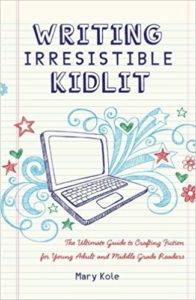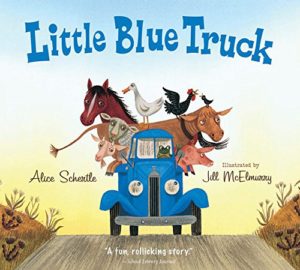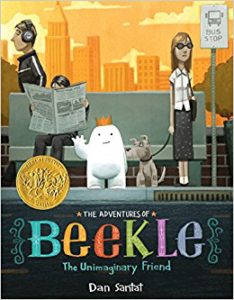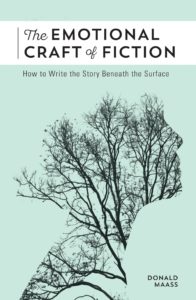This month’s Industry Insider interview is with freelance editor and book consultant Mary Kole. I know her from Way Back When because she was the then-assistant to my then-literary agent, and in that role, Mary Kole provided solid feedback and advice on some of my kidlit projects.
 She’s perhaps the ultimate Industry Insider because she’s done such a wide range of things in the world of writing and publishing. She earned an English and Theatre BA at Santa Clara University, then began a career freelance writing for newspapers and magazines, including the Los Angeles Times. While pursuing her MFA in Creative Writing at the University of San Francisco, she interned at her first literary agency. Upon completing her degree and securing representation for her own writing, she interned in the children’s editorial department at Chronicle Books in San Francisco.
She’s perhaps the ultimate Industry Insider because she’s done such a wide range of things in the world of writing and publishing. She earned an English and Theatre BA at Santa Clara University, then began a career freelance writing for newspapers and magazines, including the Los Angeles Times. While pursuing her MFA in Creative Writing at the University of San Francisco, she interned at her first literary agency. Upon completing her degree and securing representation for her own writing, she interned in the children’s editorial department at Chronicle Books in San Francisco.
She went on to read for the Andrea Brown Literary Agency (that’s where I first ran across her!), one of the oldest and most prestigious children’s book literary agencies in America. Three and a half happy years there as an Associate Agent gave her a solid foundation in the business and cemented her love for all things children’s literature. She then became a Senior Literary Manager and founder of the children’s book department at Movable Type Management in New York City. In 2013, she left to finally pursue her first love, editorial work, full time.
“My work directly with writers had always been my favorite part of agenting,” she admits, “so it wasn’t a tough decision to make.”
Who better, then, to share industry wisdom and insight about the picture book world with the OPB family?
Website: www.marykole.com
Website: www.KidLit.com
Facebook: www.facebook.com/kidlit
Twitter: twitter.com/kid_lit
RVC: Most people probably know you as the dynamo behind Kidlit.com and/or the author of Writing Irresistible Kidlit (one of the better books on writing for authors of any genre). How did those projects come about?
MK: Thanks! I started reading for a literary agency in 2008, while I was doing my MFA. There were so many easily avoidable mistakes in the slush, and I found the whole publishing process so fascinating, that I decided to start a blog about it. Kidlit has been my platform to talk about writing and publishing ever since. It grew into a more organized book in 2013, and I challenged myself to create an entire writing reference guide from scratch, instead of using existing blog content. It was so much fun to write, because I love teaching on the subject of writing and publishing. I also included a lot of examples from my favorite books of the era, so the whole thing was like a giant book report. Writing that book was one of my fondest memories, and I’m so grateful that it’s still out there, speaking to writers.
RVC: What has doing them taught you?
MK: It’s funny. My agent for the book was Andrea Brown, who was my boss at the time. The book cleared acquisitions and I was pretty much floating when Andrea called. But the first thing she told me was, “This book deal isn’t going to change your life.” If you know Andrea, you’ll laugh. She is wise but can sometimes be quite direct. In the moment, I really thought she was raining on my parade. But she was right. Publishing a book, believe it or not, didn’t change my day-to-day life. Sure, it’s probably the accomplishment I’m most proud of, but I didn’t wake up on a yacht the day after it came out, if you know what I mean. What it has done, however, is push me to think deeper and harder about my craft, and to come up with new ideas, better ideas…
The book and the blog are my challenge and my motivation. They both inspire me to keep putting one foot in front of the other. I think I finally understand Andrea’s point. The book deal wasn’t the life-changing destination. It was the first step of the journey of my life’s work.
RVC: You’ve worked in publishing (Chronicle Books), agenting (Andrea Brown Literary and Movable Type Management), and the freelance world—the bookworld trifecta! Which of these held the most surprises?
MK: I’ll take the “triple threat” label. As a former (tragic) theatre major who couldn’t act, sing, or dance, this is probably the first time it has applied! Agenting was probably the biggest wake-up call. I was surprised by how big the global publishing world is (hellooooo, Bologna Children’s Book Fair), and also how small, sometimes. Meaning that it sometimes really does come down to category and trend and what a house wants to publish and what the spreadsheet projections say. Projects I loved would fail to sell and utter tripe would shoot up the lists. It was a crash course in the intersection between art and business. And I’m still not entirely sure that it’s not all a complete and total crapshoot.
But one thing I learned is that writers who keep working and honing their craft and coming up with new ideas do tend to persevere. There is a place on shelves for those who are dedicated enough to learn the business side of things. At one point or another, business and art might just intersect with their particular project. The point is to be out there, waiting at that intersection, as frequently as possible. That’s why I like my current job best of all: I can work directly with creators to take their work to the next level. After all, “Success is where preparation and opportunity meet.” I can’t guarantee when opportunity will come, but I’m all about being prepared for it!
RVC: Let’s talk about viable career paths. (I’m thinking about some of my own creative writing students, armed with a world of ambition and a BFA degree in creative writing.) Would you recommend that my students do what you did and try it all out? Or do you think there might be better rewards—creative, financial, or otherwise—in one of those areas? Is one easier to break into? Does one come with more sand traps and alligator pits?
MK: Publishing is a tough field to make a career in, I’m not going to lie to you. To work at a house, you’ll need to live in a place where publishers operate. For a lot of people, that’s NYC. Aspiring editors flood into the city every day. Houses tend to have a lot of entry-level openings but sometimes career progression is slow. You always answer to someone above you who dictates the flavor of your list.
Agenting, on the other hand, can be a huge trial and error process. You will often work with mentors for a long time before building your own list. But you have more relative autonomy to find your own superstars—and make your own mistakes. You will always be networking, trying to find both clients and editors who you can form relationships with. Houses often take several years to pay for a book in full and agenting is largely commission-based, unless you’re with a big agency that will pay you a draw. So you are going out to $22 drinks in Manhattan with the help of Mr. Mastercard and hoping it’ll turn a corner soon. Or at least I was! In both of these fields, people get started by interning or reading for publishers or agencies for free. This is hungry, long, and tiring work. You learn a lot but the slush is unrelenting and you can’t pay rent with reader reports.
With freelance editing, you can hang up your shingle with a stylish website and start working with clients immediately. But your first few years are going to be taken up with establishing yourself and marketing your services. If you want to charge money, you’ll need to convince people you’re worth what you’re charging. Reading experience with publishers or agencies comes in very handy here. (Maybe now you know why I went for the triple threat?)
Overall, the people who do well in publishing tend to be hustlers. They will make a name for themselves. There’s always the visionary publisher who everyone wants to work with, the hot agent who has the best projects, the desirable editor with the waiting list. Reputation is key. And from what I remember of my BA/MFA experience, marketing classes weren’t a requirement. They really should be.
RVC: In your six years as an agent, you ran across oodles of picture book manuscript submissions. While we all know many of the general things that make a book work—interesting characters, compelling plot, appropriate pacing, etc.—what signaled to you that “Wow, this writer is good and I really need to take my time with this manuscript!”?
MK: Small characterizing details about the protagonist always seem to set a project apart, as well as the character’s ability to feel deeply. This last bit always gets me. If a writer is able to capture an emotion in a way that creates the emotion inside of me, I am immediately intrigued. The slush is full of picture book manuscripts that dutifully list a character’s favorite stuffed animals and ice cream flavor and favorite sport in an attempt for readers to “know” that character. But such a list is useless in terms of getting at the marrow of the protagonist as a person. If a writer, on the other hand, is to write, for example, “Petey looked up at the moon. He wondered if anyone in the whole wide world was seeing it right then,” that stirs up a deeper sense of Petey. He’s maybe lonely. He maybe feels like an outsider. I’m not told this, explicitly. But I’d much rather know what a character thinks about or how they see their world or what their experience is within it than…you know…that their favorite color is red.
RVC: If you had to recommend two picture books as mentor texts for beginning picture book writers, which two would you choose? And what lessons would they impart?
 MK: I’ll do three to cover plot, voice, and character. Little Blue Truck by Alice Schertle and illustrated by Jill McElmurry has earned its success for a reason. A lot of writers out there want to write in rhyme. But they get so caught up in their rhyming pairs and the style of their prose that they forget—books need story. Here, an unlikely and humble hero saves the day by being who he always is. In the meantime, with all the animal sounds and the high stakes plot, this book has enough movement and fun to be an engaging read-aloud for even the youngest kids.
MK: I’ll do three to cover plot, voice, and character. Little Blue Truck by Alice Schertle and illustrated by Jill McElmurry has earned its success for a reason. A lot of writers out there want to write in rhyme. But they get so caught up in their rhyming pairs and the style of their prose that they forget—books need story. Here, an unlikely and humble hero saves the day by being who he always is. In the meantime, with all the animal sounds and the high stakes plot, this book has enough movement and fun to be an engaging read-aloud for even the youngest kids.
A lot of people like to write “sweet” books about how precious childhood is. If this is your goal, study Little Bitty Friends by Elizabeth McPike, illustrated by Patrice Barton. It’s very simple and veeeeeery sweet but the childlike voice and wonder on every page really make it stand out, along with a satisfying last page. It’s also in rhyme. This captures childhood without outright telling about how amazing and  wonderful it all is, which I see way too often.
wonderful it all is, which I see way too often.
For a great picture book character, study The Adventures of Beekle: The Unimaginary Friend by Dan Santat. This is such a touching story, but without being syrupy or heavy-handed. Beekle is a great example of a character who has a problem and works creatively and endearingly to solve it. His objective and motivations are really well-defined. A lot of picture books don’t put their protagonist in the driver’s seat, which is a grave mistake. Ideally, it’s about empowering our young audience!
RVC: While you can handle nearly any type of story in your capacity as a freelance editor, you’ve clearly got a knack for kidlit and picture book authors. What’s the most common challenge picture book clients have when they come to you for guidance and help?
MK: The most common error aspiring picture book writers make is to overtly teach their audience. They have a theme they’re writing about and they want everyone to know it. This is understandable. But a didactic picture book manuscript will die a quick death in the slush. Kids are told what to do all day long. They don’t want an overt lesson positioned at the end of a book they’re reading for fun.
The best way around this common pitfall is to convey the lesson via the main character’s experience, so that the reader can appreciate it firsthand and “discover” it themselves. Empower your protagonist and for the love of all things good—never have a wise adult swoop in at the end to deliver the message. We all love Granny, but the final moment of discovery in a picture book belongs to the child-age main character.
Here’s one of my links on this very topic: www.kidlit.com/2014/07/14/picture-book-wisdom-from-without-vs-within
RVC: Warning signs a writer should watch for when looking at hiring a freelance editor?
MK: Unfortunately, if they’re too nice, you are not getting value from the service. That’s not to say that I Simon Cowell people’s work to shreds for the fun of it. Or that I level arbitrary criticism just to make it look like I did something. Or that I’m mean. But if your editor has one or two pieces of mild feedback and mostly encouragement, they may make a wonderful critique partner or coffee buddy, but they are giving you unrealistic expectations of your work.
Publishing is a tough business. Rejection is everywhere. If you get a green light and a thumbs up from a “professional,” you’re vulnerable to having your hopes crushed when you actually go out on submission. I’d say it’s better to invest in tough feedback, and do the hard work early in the process, then reap the potential rewards later.
These types of nice editors are very tempting because praise feels good. Work sucks. Being told that you need to do a heavy revision? Just ugh. But the writers who tend to be the most successful in their endeavors are the ones who aren’t afraid of rolling up their sleeves and diving in. Light notes breed complacency. If you’ve tried to submit with no luck, slightly tweaking a manuscript that actually needs substantial revision is only going to bring you the same results.
I consider myself nice to the client but realistic about the work, which sometimes comes across as challenging. But I’ve been building my credibility for ten years. Me blowing smoke at a client just to make them feel warm and fuzzy isn’t going to do either of us any good. My approach comes from experience in the publishing industry, and knowing how cutthroat it can be. Remember, anyone can hang a shingle out and proclaim themselves an editor. Do they have the experience and, more importantly, the level of feedback to back themselves up?
RVC: Rhyme + picture books. Thoughts?
MK: Rhyme can be so tough. Publishers obviously still publish rhyming books. Two of the mentor texts I cited above use rhyme. But most agents and publishers aren’t looking for rhyme and do not put it on their wish lists. Why? Simply put, most amateur rhyme needs more work. Writers find a rhyming pattern and think they’re done. But what about rhythm? Stressed and unstressed syllables? Are they putting rhyme above all else or does the rhyme actually serve the story? There’s an outdated notion that picture books have to rhyme. Well, the industry has shifted tremendously toward looser, more colloquial prose storytelling. The question everyone needs to ask themselves is, “Does this have to be in rhyme? Why?” If you’re just doing it because you think you have to, I’d say that doesn’t bode well. Take it out of rhyme and explore what the story actually is. Most aspiring rhyme writers get so caught up in the style that they neglect the substance, and it really should be the other way around.
RVC: Speed round! Fav dish by your chef husband?
MK: He makes this raw shaved artichoke and arugula salad that I love. There’s also a chicken thigh curry tagine he cooks that’s out of control. Before we had our son, he spent weekends cooking these giant pots of stews and freezer meals. It gets cold in Minnesota, don’tcha know! Some of my favorite memories are of us devouring those stews and goulashes after we’d gotten our baby to sleep. But, really, I gratefully eat anything he makes.
RVC: Your two pugs, Olive and Gertie. Which has a better sense of humor?
MK: Gertie is a true pug and loafs around all day. Then she gets this wild burst of energy sometimes, and runs around crazed. It’s hilarious. Olive, on the other hand, is wily. If there’s even the whiff of food anywhere, don’t turn your back. We were setting up for a party one time and left a chair pulled away from the table. That’s all it took for Olive to decimate our buffet spread. She ate an entire coffee cake!
RVC: #1 poolside drink for a summer scorcher in Minneapolis?
MK: Change “pool” to “lake” or “river” and now you’re talking! We have a cabin on the beautiful St. Croix River, and refreshments are a must on the pontoon boat. I don’t drink, so I’ve gotten pretty good at mocktails. They’re usually built around various flavors of La Croix sparkling water (apricot and tangerine are my favorites) or kombucha (Brew Dr.’s “Love” flavor). Sometimes I’ll throw in some fresh berries and mint. My son wakes up at dawn, which, in the summer is about 5:30 a.m., so cold brew coffee is almost another member of the family.
RVC: Most terrific writing how-to book you’ve read?
MK: I see everyone on this blog recommending Ann Paul’s Writing Picture Books, so I would toss in another vote for that. I loved The Emotional Craft of Fiction by Donald Maass, even though it’s not geared for picture book writers. It reminds us that we strive to create emotional responses in the reader, and a lot of people forget to consider that.
RVC: Three words that describe your editing style.
MK: Honest, tough, encouraging.
I really don’t want to portray myself as a monster or a jerk. But I will say this: Every writer who has the spark can learn something from working with me. Every project can take one or several steps forward. As long as someone is committed to learning and growing in their craft, I will help them. I have never said “Don’t quit your day job” to a writer, because as long as there’s a willingness to learn, there’s progress to be made. Mean feedback can kill a writer’s motivation for years to come. Trying to package my feedback in a way that’s going to motivate and galvanize a writer, instead of squash their mojo, is a responsibility that I take very seriously.
RVC: Best thing someone said about Writing Irresistible Kidlit.
MK: I am lucky that my book has enjoyed some great reviews from aspiring writers. I can’t pick a specific piece of feedback. One of my editorial clients called me “a one-woman MFA program,” though, and that has really stuck out to me. The other feedback that I love to get is that I’ve played a small role, whether through my editorial work, book, or blog, in helping a writer either return to writing after a long time away or take the next step in their journey, whether that’s getting agented or a earning a book contract. I really love to be there on the sidelines for these big “dreams coming true” occasions.
Andrea may have been right that signing a book deal doesn’t change a person’s whole life, but that pure awe and satisfaction of publishing a book? It’s like nothing else!
RVC: Thanks so much, Mary Kole!


